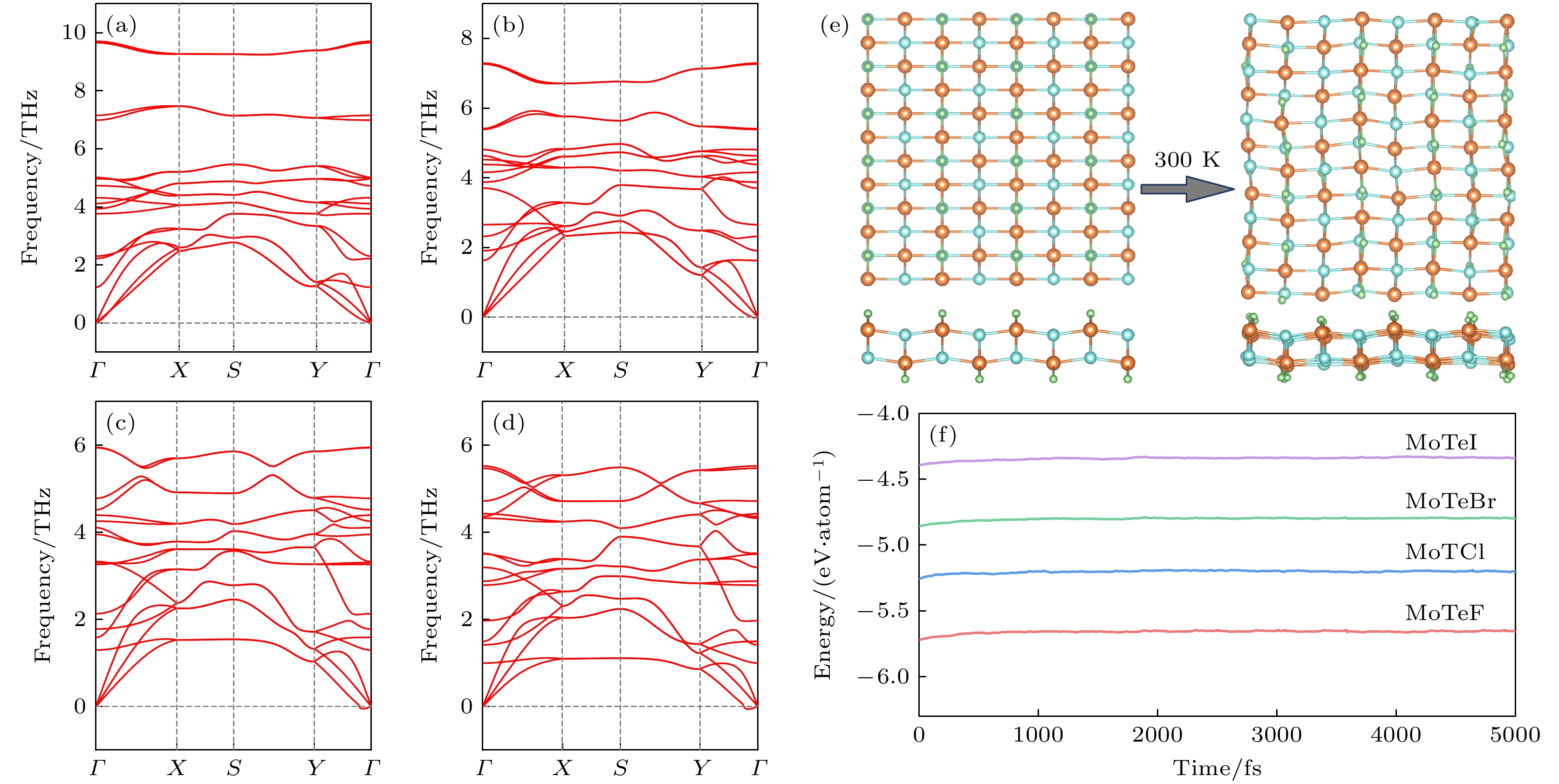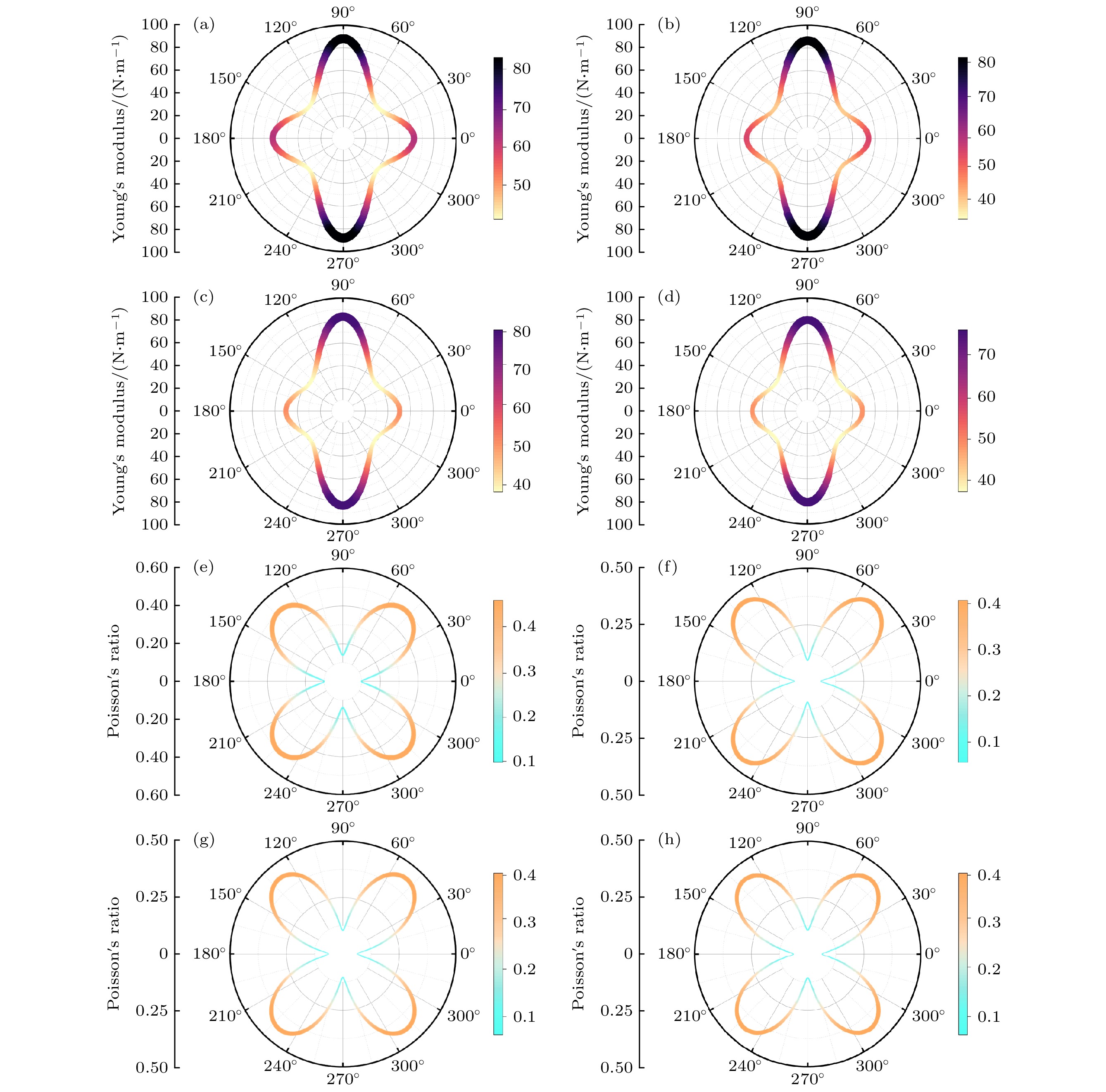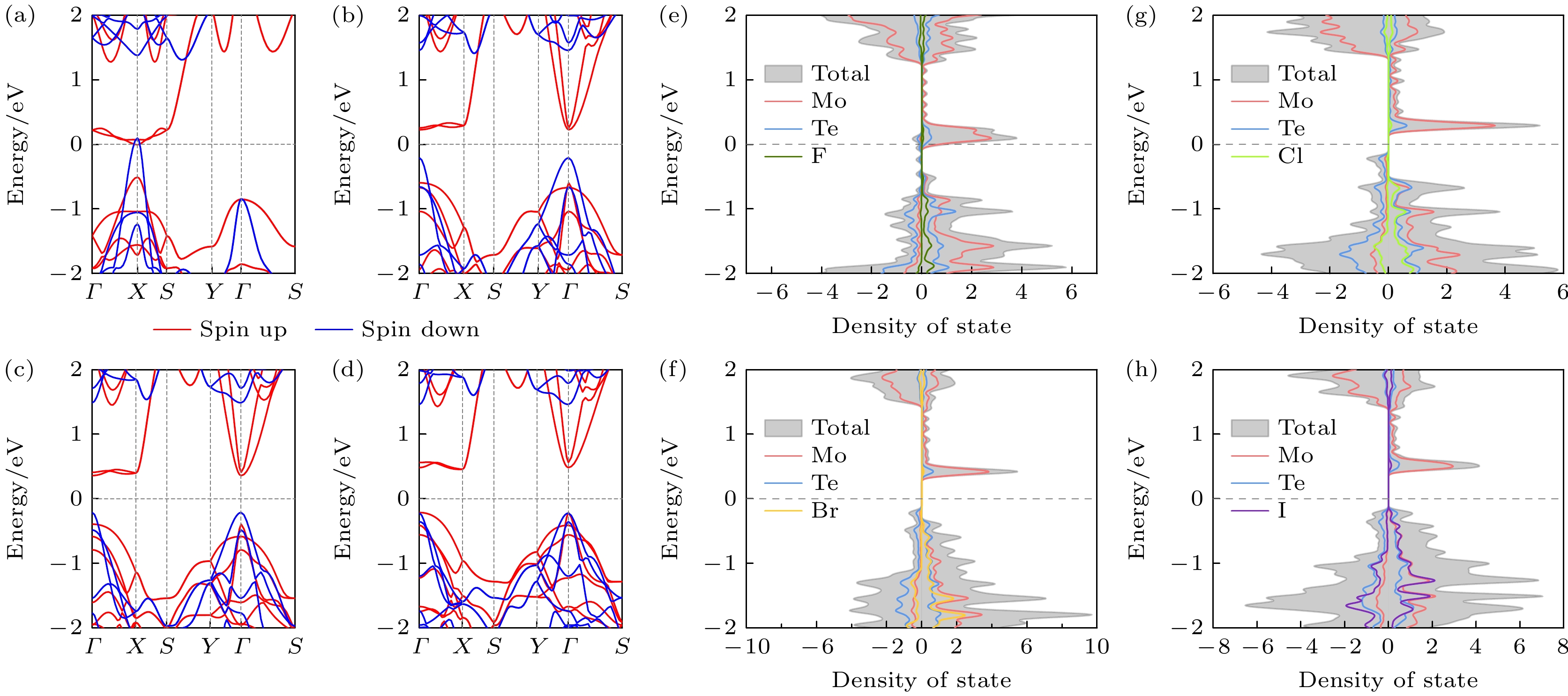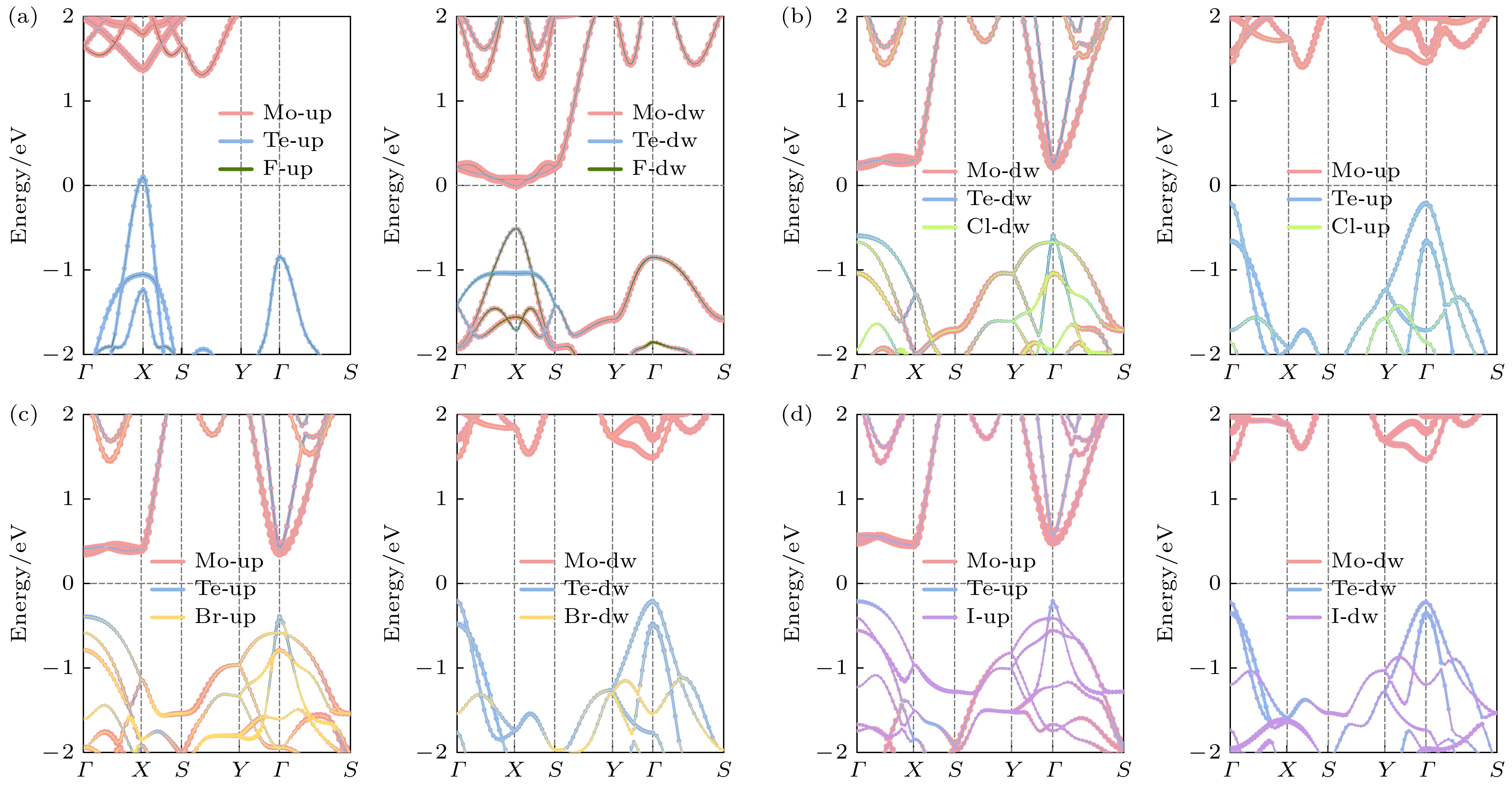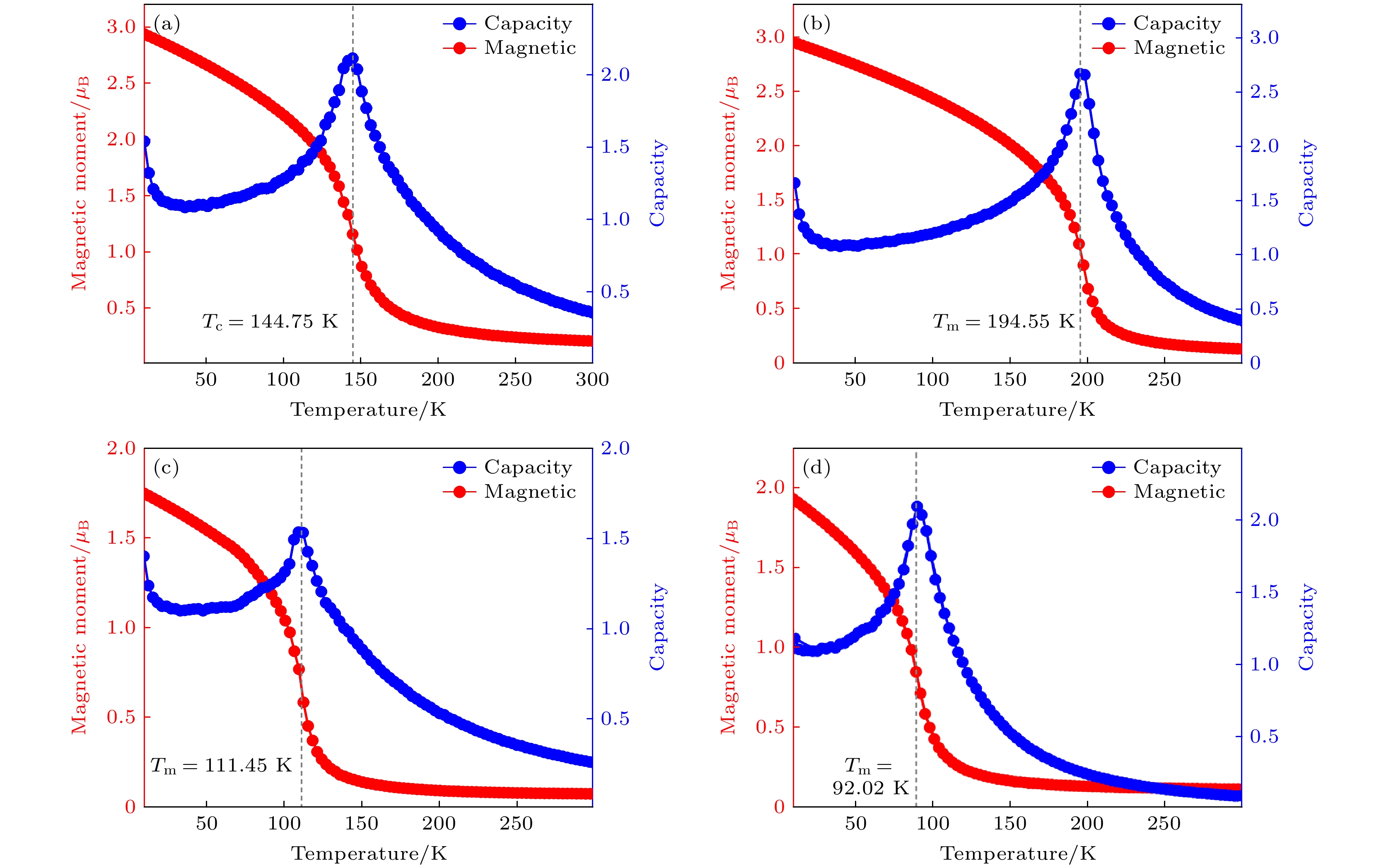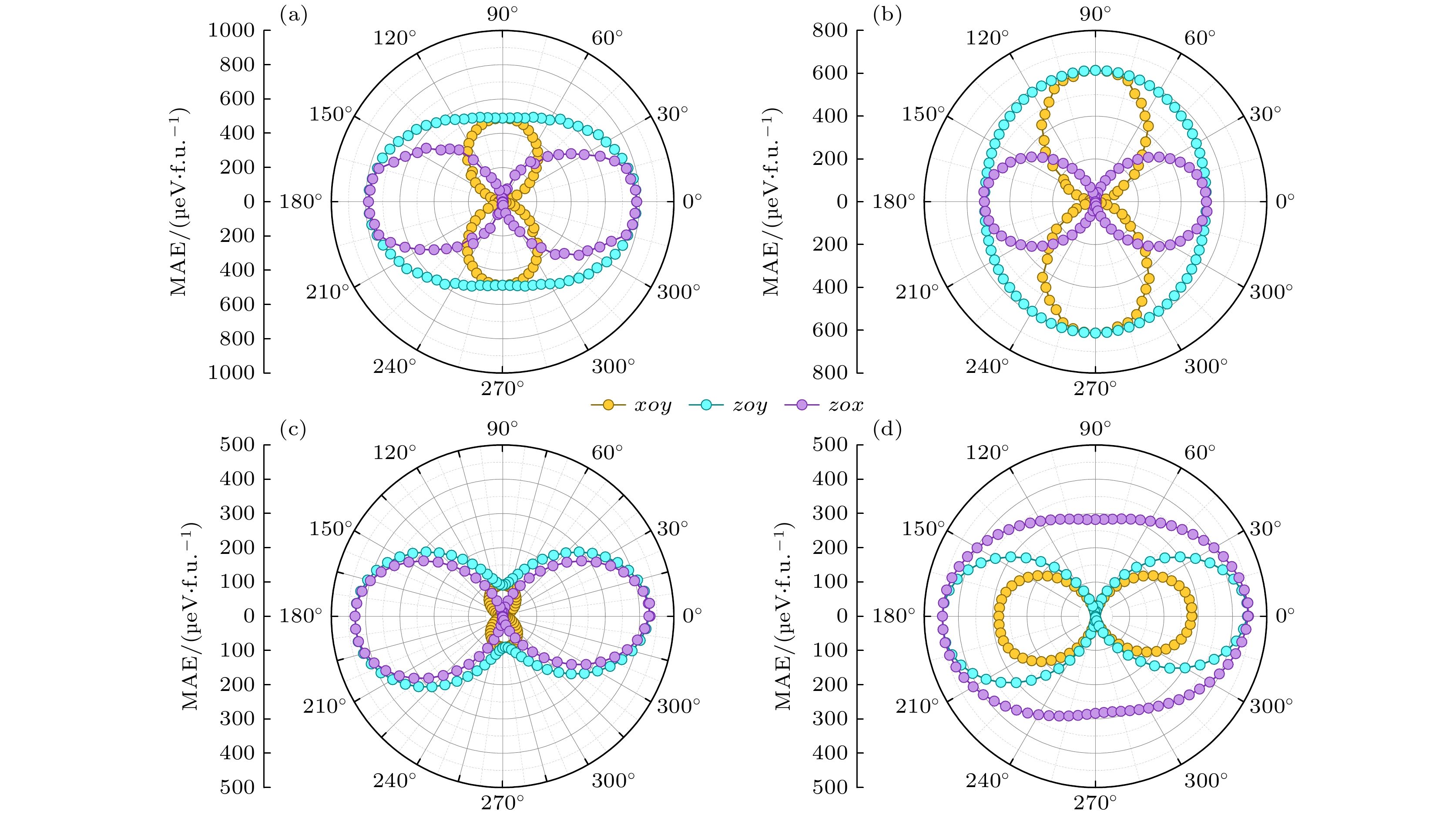-
同时具有铁磁性与铁弹性的二维材料为磁性控制提供了全新机制, 即通过切换材料的铁弹态控制磁化方向. 源自半填充3d轨道的大磁矩和自发结构极化, 使单分子层MoTeX (X = F, Cl, Br, I)成为潜在的磁弹性多铁材料. 本文基于第一性原理计算, 系统地研究了单分子层MoTeX (X = F, Cl, Br, I)的铁磁性、铁弹性以及磁弹耦合性质. 计算结果表明单分子层MoTeX为本征半导体, 同时具有铁磁性和铁弹性. 单分子层MoTeX的面内磁晶各向异性能显著, 较高的磁晶各向异性能表明其具有抵抗热扰动的能力, 能在有限温度下维持长程磁有序. 另外, 单分子层MoTeX的易磁化轴均沿着平面内方向. 单分子层MoTeX在铁弹性转变过程中表现出相同幅度但符号相反的平面内磁各向异性能, 意味着面内易磁化轴随铁弹态的转换旋转了90°. 另外, 其铁弹转换势垒(0.180—0.226 eV/atom)适中, 表明单分子层MoTeX在室温下的可逆铁弹性转换和平面内易磁化轴的可逆转换. 本文提出了一种二维本征多铁半导体材料, 为多功能自旋电子器件提供了新候选材料.Two-dimensional materials with both ferromagnetism and ferroelasticity present new possibilities for developing spintronics and multifunctional devices. These materials provide a novel method for controlling the direction of the magnetization axis by switching the ferroelastic state, achieving efficient and low-power operation of magnetic devices. Such properties make them a promising candidate for the next generation of non-volatile memory, sensors, and logic devices. By performing the first-principles calculations, the ferromagnetism, ferroelasticity, and magnetoelastic coupling in MoTeX (X = F, Cl, Br, I) monolayers are systematically investigated. The results indicate that the MoTeX monolayers are intrinsic semiconductors holding both ferromagnetism and ferroelasticity. The pronounced in-plane magnetic anisotropy suggests that the MoTeX monolayers can resist thermal disturbances and maintain long-range magnetic order. The Curie temperatures of MoTeX monolayers are 144.75 K, 194.55 K, 111.45 K, and 92.02 K, respectively. Our calculations show that the four MoTeX monolayers possess two stable ferroelastic states, with their easy magnetization axes perpendicular to each other. The ferroelastic transition barriers between the two ferroelastic states of MoTeF, MoTeCl, MoTeBr, MoTeI monolayers are 0.180 eV/atom, 0.200 eV/atom, 0.209 eV/atom, and 0.226 eV/atom, respectively, with their corresponding reversible strains of 54.58%, 46.32%, 43.06%, and 38.12%. These values indicate the potential for reversible magnetic control through reversible ferroelastic transition at room temperature. Owing to their unique magnetoelastic coupling properties, MoTeX monolayers exhibit the ability to control reversible magnetization axis at room temperature, laying the foundation for the development of highly controllable and stable spintronic devices.
-
Keywords:
- two-dimensional materials /
- density functional theory /
- ferromagnetism /
- ferroelasticity /
- magnetoelastic coupling
[1] Fert A 2008 Rev. Mod. Phys. 80 1517
 Google Scholar
Google Scholar
[2] Felser C, Fecher G H, Balke B 2007 Angew. Chem. Int. Ed. 46 668
 Google Scholar
Google Scholar
[3] Wolf S A, Awschalom D D, Buhrman R A , Daughton J M, Molnar S V, Roukes M L, Chtchelkanova A Y, Treger D M 2001 Science 294 1488
 Google Scholar
Google Scholar
[4] Song Q, Occhialini C A, Ergecen E, Ilyas B, Amoroso D, Barone P, Kapeghian J, Watanabe K, Taniguchi T, Botana A S, Picozzi S, Gedik N, Comin R 2022 Nature 602 601
 Google Scholar
Google Scholar
[5] Xu S, Jia F, Yu X, Hu S, Gao H, Ren W 2022 Mater. Today Phys. 27 100775
 Google Scholar
Google Scholar
[6] Spaldin N A, Fiebig M 2005 Science 09 391
 Google Scholar
Google Scholar
[7] Hu T, Kan E 2019 Wiley Interdiscip. Rev. - Comput. Mol. Sci. 9 e1409
 Google Scholar
Google Scholar
[8] Mermin N D, Wagner H 1966 Phys. Rev. Lett. 17 1133
 Google Scholar
Google Scholar
[9] Huang B, Clark G, Navarro-Moratalla E, Klein D R, Cheng Ran, Seyler K L, Zhong D, Schmidgall E, McGuire M A, Cobden D H, Yao W, Xiao D, Jarillo-Herrero P, Xu X 2017 Nature 546 270
 Google Scholar
Google Scholar
[10] Mosendz O, Pisana S, Reiner J W, Stipe B, Weller D 2012 J. Appl. Phys. 111 07B729
 Google Scholar
Google Scholar
[11] Gong C, Li L, Li Z, Ji H, Stem A, Xia Y, Cao T, Bao W, Wang C, Wang Y, Qiu Z Q, Cava R J, Louie S G, Xia J, Zhang X 2017 Nature 546 265
 Google Scholar
Google Scholar
[12] Xu S, Jia F, Cheng X, Ren W 2021 J. Mater. Chem. C 9 17152
 Google Scholar
Google Scholar
[13] Wenisch J, Gould C, Ebel L, Storz J, Pappert K, Schmidt M J, Kumpf C, Schmidt G, Brunner K, Molenkamp L W 2007 Phys. Rev. Lett. 99 077201
 Google Scholar
Google Scholar
[14] Cenker J, Sivakumar S, Xie K, Miller A, Thijssen P, Liu Z, Dismukes A, Fonseca J, Anderson E, Zhu X, Roy X, Xiao D, Chu J, Cao T, Xu X 2022 Nat. Nanotechnol. 17 256
 Google Scholar
Google Scholar
[15] Hu J M, Nan C W 2009 Phys. Rev. B 80 224416
 Google Scholar
Google Scholar
[16] Shen S Y, Xu X L, Huang B BA, Kou L Z, Dai Y, Ma Y D 2021 Phys. Rev. B 103 144101
 Google Scholar
Google Scholar
[17] Weston A, Castanon E G, Enaldiev V, Ferreira F, Bhattacharjee S, Xu S, Corte-Leon H, Wu Z, Clark N, Summerfield A, Hashimoto T, Gao Y, Wang W, Hamer M, Read H, Fumagalli L, Kretinin A V, Haigh S J, Kazakova O, Geim A K, Falko V, Gorbachev R 2022 Nat. Nanotechnol. 17 390
 Google Scholar
Google Scholar
[18] Abdullahi Y Z, Vatansever Z D, Ersan F, Akinci U, Akturk O U, Akturk E 2021 Phys. Chem. Chem. Phys. 23 6107
 Google Scholar
Google Scholar
[19] Akgenc B, Vatansever E, Ersan F 2021 Phys. Rev. Mater. 5 83403
 Google Scholar
Google Scholar
[20] Abdullahi Y Z, Ersan F, Vatansever Z D, Akturk E, Akturk O U 2020 J. Appl. Phys. 128 113903
 Google Scholar
Google Scholar
[21] Vaclavkova D, Delhomme A, Faugeras C, Potemski M, Bogucki A, Suffczynski J, Kossacki P, Wildes A R, Gremaud B, Saul A 2020 2D Mater. 7 035030
 Google Scholar
Google Scholar
[22] Xiao G, Xiao W Z, Feng Y X, Rong Q Y, Chen Q 2023 Nanoscale 15 17963
 Google Scholar
Google Scholar
[23] Guo Z, Liu Y, Jiang H, Zhang X, Jin L, Liu C, Liu G 2023 Mater. Today Phys. 36 101153
 Google Scholar
Google Scholar
[24] Li Y H, Deng J, Zhang Y F, Jin X, Dong W H, Sun J T, Pan J B, Du S X 2023 npj Comput. Mater. 9 50
 Google Scholar
Google Scholar
[25] Yang H, Song M, Li Y, Guo Y, Han K 2022 Physica E 143 115341
 Google Scholar
Google Scholar
[26] Xu S, Jia F, Zhao G, Wu W, Ren W 2021 J. Mater. Chem. C 9 9130
 Google Scholar
Google Scholar
[27] Feng Y, Wang Z, Liu N, Yang Q 2023 Nanoscale 15 4546
 Google Scholar
Google Scholar
[28] Hu M, Xu S, Liu C, Zhao G, Yu J, Ren W 2020 Nanoscale 12 24237
 Google Scholar
Google Scholar
[29] Xu B, Li S C, Jiang K, Yin J, Liu Z G, Cheng Y C, Zhong W Y 2020 Appl. Phys. Lett. 116 052403
 Google Scholar
Google Scholar
[30] Sun H, Qu Z, Li A, Wan Y, Wu F, Huang C, Kan E 2023 Appl. Phys. Lett. 123 042901
 Google Scholar
Google Scholar
[31] Zeng Y, Gu P, Zhao Z, Zhang B, Lin Z, Peng Y, Li W, Zhao W, Leng Y, Tan P, Yang T, Zhang Z, Song Y, Yang J, Ye Y, Tian K, Hou Y 2022 Adv. Mater. 34 2108847
 Google Scholar
Google Scholar
[32] Gu P, Sun Y, Wang C, Peng Y, Zhu Y, Cheng X, Yuan K, Lyu C, Liu C, Tan Q, Zhang Q, Gu L, Wang Z, Han Z, Watanabe K, Taniguchi T, Yang J, Zhang J, Ji W, Tan P, Ye Y 2022 Nano Lett. 22 1233
 Google Scholar
Google Scholar
[33] Blochl P 1994 Phys. Rev. B 50 17953
 Google Scholar
Google Scholar
[34] Kresse G, Furthumller J 1996 Phys. Rev. B 54 11169
 Google Scholar
Google Scholar
[35] Blochl P E, Forst C J, Schimpl J 2003 Bull. Mater. Sci. 26 33
 Google Scholar
Google Scholar
[36] Monkhorst H J, Pack J D 1976 Phys. Rev. B 13 5188
 Google Scholar
Google Scholar
[37] Togo A, Oba F, Tanaka I 2008 Phys. Rev. B 8 134106
 Google Scholar
Google Scholar
[38] Togo A, Tanaka I 2015 Scr. Mater. 108 1
 Google Scholar
Google Scholar
[39] Cadelano E, Palla P L, Giordano S, Colombo L 2010 Phys. Rev. B 82 235414
 Google Scholar
Google Scholar
[40] Kanamori J 1960 J. Appl. Phys. 31 S14
 Google Scholar
Google Scholar
[41] Goodenough J B 1955 Phys. Rev. 100 564
 Google Scholar
Google Scholar
[42] Dang N T, Kozlenko D P, Lis O N, Kichanov S E, Lulin Y V, Golosova N O, Savenko B N, Duong D L, Phan T L, Tran T A, Phan M H 2023 Adv. Sci. 10 2206842
 Google Scholar
Google Scholar
[43] Miao N, Xu B, Zhu L, Zhou J, Sun Z 2018 J. Am. Chem. Soc. 140 2417
 Google Scholar
Google Scholar
[44] Gao Z, Wang Y, Gao J, Cui Z, Zhang X, Shi J, Fan X 2022 Comput. Mater. Sci. 213 111611
 Google Scholar
Google Scholar
[45] Henkelman G, Uberuaga B P, Jonsson H 2000 J. Chem. Phys. 113 9901
 Google Scholar
Google Scholar
[46] Wang H, Li X, Sun J, Liu Z, Yang J 2017 2D Mater. 4 045020
 Google Scholar
Google Scholar
[47] Pang Z, Ji W, Zhang C, Wang P, Li P 2021 Chem. Phys. Lett. 763 138163
 Google Scholar
Google Scholar
[48] Zhang S, Liu B 2018 Nanoscale. 10 5990
 Google Scholar
Google Scholar
[49] Li W, Li J 2016 Nat. Commun. 7 10843
 Google Scholar
Google Scholar
-
图 1 MoTeX (X = F, Cl, Br, I)单层膜的顶视图(a)和侧视图(b). J1, J2和J3分别是最邻近的第一、第二和第三个Mo原子之间的层内磁交换参数; (c)铁磁(FM)俯视图; (d)— (f) MoTeX单层膜的三种反铁磁(AFM)构型. 橙色、蓝色和绿色的球分别代表Mn, O和X原子
Fig. 1. (a) Top and (b) side views of the MoTeX (X = F, Cl, Br, I) monolayers. J1, J2 and J3 are the intralayer magnetic exchange parameters between the first, second and third nearest neighboring Mo atoms, respectively; (c) top views of ferromagnetic (FM); (d)–(f) three antiferromagnetic (AFM) configurations of MoTeX monolayers. The orange, blue and green balls represent Mn, O and X atoms, respectively.
图 2 单层MoTeX (X = F, Cl, Br, I)的声子谱 (a) MoTeF; (b) MoTeCl; (c) MoTeBr; (d) MoTeI. (e) 分子动力学模拟开始和结束时原子结构的俯视图和侧视图. (f) MoTeF, MoTeCl, MoTeBr和MoTeI单层膜在300 K, 5 ps下的AIMD模拟过程中总能量的波动
Fig. 2. Phonon spectra of MoTeX (X = F, Cl, Br, I) monolayers: (a) MoTeF; (b) MoTeCl; (c) MoTeBr; (d) MoTeI. (e) Top and side views of atomic structures at the start and end of molecular dynamics (MD) simulation. (f) Evolution of total energies of MoTeF, MoTeCl, MoTeBr and MoTeI monolayers during AIMD simulation at 300 K for 5 ps.
图 3 (a) MoTeF, (b) MoTeCl, (c) MoTeBr, (d) MoTeI单层膜杨氏模量随面内角的变化; (e) MoTeF, (f) MoTeCl, (g) MoTeBr, (h) MoTeI单层膜泊松比随面内角的变化
Fig. 3. Variations of Young’s modulus of (a) MoTeF, (b) MoTeCl, (c) MoTeBr, and (d) MoTeI monolayers with respect to the in-plane angle. Variations of Poisson’s ratio of (e) MoTeF, (f) MoTeCl, (g) MoTeBr and (h) MoTeI monolayers with respect to the in-plane angle.
图 4 单层MoTeX (X = F, Cl, Br, I)的能带结构与态密度图 (a) MoTeF; (b) MoTeCl; (c) MoTeBr; (d) MoTeI. 费米能级用0 eV的虚线表示. 红色和蓝色曲线分别表示自旋向上和自旋向下通道. 单层MoTeX (X = F, Cl, Br, I)的总态密度(TDOS)和投影态密度 (e) MoTeF; (f) MoTeCl; (g) MoTeBr; (h) MoTeI
Fig. 4. Electronic band structures of MoTeX (X = F, Cl, Br, I) monolayers: (a) MoTeF; (b) MoTeCl; (c) MoTeBr; (d) MoTeI. Fermi level is denoted by the dashed line at 0 eV. Red and blue curves represent the spin up and spin down channels, respectively. Total density of states (TDOS) and project density of states of MoTeX (X = F, Cl, Br, I) monolayers: (e) MoTeF; (f) MoTeCl; (g) MoTeBr; (h) MoTeI monolayers.
图 8 (a) MoTeX (X = F, Cl, Br, I)单层的铁弹性转换和磁弹性耦合示意图, 铁弹性开关将使易磁化轴旋转90º, 如红色箭头所示; (b) MoTeX单层膜沿铁弹性过渡路径的相对能量
Fig. 8. (a) Schematic diagram showing the ferroelastic switching and coupling between magnetism and ferroelasticity for the MoTeX (X = F, Cl, Br, I) monolayers, the ferroelastic switching will rotate the easy magnetization axis by 90º, as illustrated by the red arrows; (b) relative energy of the MoTeX monolayers along the ferroelastic transition path.
表 1 MoTeX (X = F, Cl, Br, I)的晶格常数、可逆应变、反铁磁构型相对铁磁构型的能量
Table 1. Lattice constant, reversible strain and the relative energies of FM and possible AFM configurations of MoTeX monolayers. The energy of FM configuration is a reference.
ML a/Å b/Å (|b|/|a|–1)×100% EFM/(meV·Mo–1) EAFM1/(meV·Mo–1) EAFM2/(meV·Mo–1) EAFM3/(meV·Mo–1) MoTeF 3.704 5.726 54.58 0 283 270 552 MoTeCl 3.906 5.715 46.31 0 306 301 509 MoTeBr 3.992 5.710 43.04 0 361 334 453 MoTeI 4.124 5.696 38.11 0 390 378 397 表 2 MoTeX (X = F, Cl, Br, I)单层膜的弹性模量和力学性能
Table 2. Elastic modulus and mechanical properties of MoTeX (X = F, Cl, Br, I) monolayers.
ML C11/(N·m–1) C12/(N·m–1) C22/(N·m–1) C66/(N·m–1) Ymax/(N·m–1) Ymin/(N·m–1) μmax μmin MoTeF 63.412 8.814 89.320 13.750 88.095 41.059 0.504 0.099 MoTeCl 54.424 5.000 86.926 13.809 86.467 39.404 0.448 0.058 MoTeBr 50.724 5.294 84.128 13.564 83.576 38.237 0.436 0.063 MoTeI 49.090 5.157 81.298 13.273 80.756 37.283 0.432 0.063 表 3 MoTeX (X = F, Cl, Br, I)单层膜交换作用路径参数. d1, d2和d3是第一, 第二和第三近邻Mo原子之间的距离, θ1, θ2和θ3是第一, 第二和第三近邻Mo原子与Te原子之间的夹角
Table 3. Parameters along the exchange interaction path of MoTeX (X = F, Cl, Br, I) monolayers. d1, d2 and d3 are the distances between the first, second and third nearest neighboring Mo atoms, and θ1, θ2 and θ3 are the angles formed between the first, second and third nearest neighboring Mo atoms and Te atoms.
ML d1(Mo-Mo)/Å d2(Mo-Mo)/Å d3(Mo-Mo)/Å θ1(Mo-Te-Mo) θ2(Mo-Te-Mo) θ3(Mo-Te-Mo) MoTeF 3.70 4.24 5.72 81.94 95.85 164.47 MoTeCl 3.90 4.29 5.71 87.06 96.79 161.32 MoTeBr 3.99 4.29 5.71 89.18 96.83 160.74 MoTeI 4.12 4.28 5.69 92.40 97.05 159.54 表 4 MoTeX (X = F, Cl, Br, I)单层的磁交换常数与磁晶各向异性能
Table 4. Magnetic exchange constant and magnetocrystalline anisotropy energy of MoTeX (X = F, Cl, Br, I) monolayer
ML $ {J}_{1} $/eV $ {J}_{2} $/eV $ {J}_{3} $/eV E[100]/(μeV·atom–1) E[010]/(μeV·atom–1) E[001]/(μeV·atom–1) Tc/K MoTeF 0.14 7.72 –0.22 0 487 782 114 MoTeCl 1.85 6.65 –1.70 0 613 518 195 MoTeBr 3.79 6.25 –5.31 0 91 430 111 MoTeI 4.76 6.08 –3.93 0 –282 165 92 -
[1] Fert A 2008 Rev. Mod. Phys. 80 1517
 Google Scholar
Google Scholar
[2] Felser C, Fecher G H, Balke B 2007 Angew. Chem. Int. Ed. 46 668
 Google Scholar
Google Scholar
[3] Wolf S A, Awschalom D D, Buhrman R A , Daughton J M, Molnar S V, Roukes M L, Chtchelkanova A Y, Treger D M 2001 Science 294 1488
 Google Scholar
Google Scholar
[4] Song Q, Occhialini C A, Ergecen E, Ilyas B, Amoroso D, Barone P, Kapeghian J, Watanabe K, Taniguchi T, Botana A S, Picozzi S, Gedik N, Comin R 2022 Nature 602 601
 Google Scholar
Google Scholar
[5] Xu S, Jia F, Yu X, Hu S, Gao H, Ren W 2022 Mater. Today Phys. 27 100775
 Google Scholar
Google Scholar
[6] Spaldin N A, Fiebig M 2005 Science 09 391
 Google Scholar
Google Scholar
[7] Hu T, Kan E 2019 Wiley Interdiscip. Rev. - Comput. Mol. Sci. 9 e1409
 Google Scholar
Google Scholar
[8] Mermin N D, Wagner H 1966 Phys. Rev. Lett. 17 1133
 Google Scholar
Google Scholar
[9] Huang B, Clark G, Navarro-Moratalla E, Klein D R, Cheng Ran, Seyler K L, Zhong D, Schmidgall E, McGuire M A, Cobden D H, Yao W, Xiao D, Jarillo-Herrero P, Xu X 2017 Nature 546 270
 Google Scholar
Google Scholar
[10] Mosendz O, Pisana S, Reiner J W, Stipe B, Weller D 2012 J. Appl. Phys. 111 07B729
 Google Scholar
Google Scholar
[11] Gong C, Li L, Li Z, Ji H, Stem A, Xia Y, Cao T, Bao W, Wang C, Wang Y, Qiu Z Q, Cava R J, Louie S G, Xia J, Zhang X 2017 Nature 546 265
 Google Scholar
Google Scholar
[12] Xu S, Jia F, Cheng X, Ren W 2021 J. Mater. Chem. C 9 17152
 Google Scholar
Google Scholar
[13] Wenisch J, Gould C, Ebel L, Storz J, Pappert K, Schmidt M J, Kumpf C, Schmidt G, Brunner K, Molenkamp L W 2007 Phys. Rev. Lett. 99 077201
 Google Scholar
Google Scholar
[14] Cenker J, Sivakumar S, Xie K, Miller A, Thijssen P, Liu Z, Dismukes A, Fonseca J, Anderson E, Zhu X, Roy X, Xiao D, Chu J, Cao T, Xu X 2022 Nat. Nanotechnol. 17 256
 Google Scholar
Google Scholar
[15] Hu J M, Nan C W 2009 Phys. Rev. B 80 224416
 Google Scholar
Google Scholar
[16] Shen S Y, Xu X L, Huang B BA, Kou L Z, Dai Y, Ma Y D 2021 Phys. Rev. B 103 144101
 Google Scholar
Google Scholar
[17] Weston A, Castanon E G, Enaldiev V, Ferreira F, Bhattacharjee S, Xu S, Corte-Leon H, Wu Z, Clark N, Summerfield A, Hashimoto T, Gao Y, Wang W, Hamer M, Read H, Fumagalli L, Kretinin A V, Haigh S J, Kazakova O, Geim A K, Falko V, Gorbachev R 2022 Nat. Nanotechnol. 17 390
 Google Scholar
Google Scholar
[18] Abdullahi Y Z, Vatansever Z D, Ersan F, Akinci U, Akturk O U, Akturk E 2021 Phys. Chem. Chem. Phys. 23 6107
 Google Scholar
Google Scholar
[19] Akgenc B, Vatansever E, Ersan F 2021 Phys. Rev. Mater. 5 83403
 Google Scholar
Google Scholar
[20] Abdullahi Y Z, Ersan F, Vatansever Z D, Akturk E, Akturk O U 2020 J. Appl. Phys. 128 113903
 Google Scholar
Google Scholar
[21] Vaclavkova D, Delhomme A, Faugeras C, Potemski M, Bogucki A, Suffczynski J, Kossacki P, Wildes A R, Gremaud B, Saul A 2020 2D Mater. 7 035030
 Google Scholar
Google Scholar
[22] Xiao G, Xiao W Z, Feng Y X, Rong Q Y, Chen Q 2023 Nanoscale 15 17963
 Google Scholar
Google Scholar
[23] Guo Z, Liu Y, Jiang H, Zhang X, Jin L, Liu C, Liu G 2023 Mater. Today Phys. 36 101153
 Google Scholar
Google Scholar
[24] Li Y H, Deng J, Zhang Y F, Jin X, Dong W H, Sun J T, Pan J B, Du S X 2023 npj Comput. Mater. 9 50
 Google Scholar
Google Scholar
[25] Yang H, Song M, Li Y, Guo Y, Han K 2022 Physica E 143 115341
 Google Scholar
Google Scholar
[26] Xu S, Jia F, Zhao G, Wu W, Ren W 2021 J. Mater. Chem. C 9 9130
 Google Scholar
Google Scholar
[27] Feng Y, Wang Z, Liu N, Yang Q 2023 Nanoscale 15 4546
 Google Scholar
Google Scholar
[28] Hu M, Xu S, Liu C, Zhao G, Yu J, Ren W 2020 Nanoscale 12 24237
 Google Scholar
Google Scholar
[29] Xu B, Li S C, Jiang K, Yin J, Liu Z G, Cheng Y C, Zhong W Y 2020 Appl. Phys. Lett. 116 052403
 Google Scholar
Google Scholar
[30] Sun H, Qu Z, Li A, Wan Y, Wu F, Huang C, Kan E 2023 Appl. Phys. Lett. 123 042901
 Google Scholar
Google Scholar
[31] Zeng Y, Gu P, Zhao Z, Zhang B, Lin Z, Peng Y, Li W, Zhao W, Leng Y, Tan P, Yang T, Zhang Z, Song Y, Yang J, Ye Y, Tian K, Hou Y 2022 Adv. Mater. 34 2108847
 Google Scholar
Google Scholar
[32] Gu P, Sun Y, Wang C, Peng Y, Zhu Y, Cheng X, Yuan K, Lyu C, Liu C, Tan Q, Zhang Q, Gu L, Wang Z, Han Z, Watanabe K, Taniguchi T, Yang J, Zhang J, Ji W, Tan P, Ye Y 2022 Nano Lett. 22 1233
 Google Scholar
Google Scholar
[33] Blochl P 1994 Phys. Rev. B 50 17953
 Google Scholar
Google Scholar
[34] Kresse G, Furthumller J 1996 Phys. Rev. B 54 11169
 Google Scholar
Google Scholar
[35] Blochl P E, Forst C J, Schimpl J 2003 Bull. Mater. Sci. 26 33
 Google Scholar
Google Scholar
[36] Monkhorst H J, Pack J D 1976 Phys. Rev. B 13 5188
 Google Scholar
Google Scholar
[37] Togo A, Oba F, Tanaka I 2008 Phys. Rev. B 8 134106
 Google Scholar
Google Scholar
[38] Togo A, Tanaka I 2015 Scr. Mater. 108 1
 Google Scholar
Google Scholar
[39] Cadelano E, Palla P L, Giordano S, Colombo L 2010 Phys. Rev. B 82 235414
 Google Scholar
Google Scholar
[40] Kanamori J 1960 J. Appl. Phys. 31 S14
 Google Scholar
Google Scholar
[41] Goodenough J B 1955 Phys. Rev. 100 564
 Google Scholar
Google Scholar
[42] Dang N T, Kozlenko D P, Lis O N, Kichanov S E, Lulin Y V, Golosova N O, Savenko B N, Duong D L, Phan T L, Tran T A, Phan M H 2023 Adv. Sci. 10 2206842
 Google Scholar
Google Scholar
[43] Miao N, Xu B, Zhu L, Zhou J, Sun Z 2018 J. Am. Chem. Soc. 140 2417
 Google Scholar
Google Scholar
[44] Gao Z, Wang Y, Gao J, Cui Z, Zhang X, Shi J, Fan X 2022 Comput. Mater. Sci. 213 111611
 Google Scholar
Google Scholar
[45] Henkelman G, Uberuaga B P, Jonsson H 2000 J. Chem. Phys. 113 9901
 Google Scholar
Google Scholar
[46] Wang H, Li X, Sun J, Liu Z, Yang J 2017 2D Mater. 4 045020
 Google Scholar
Google Scholar
[47] Pang Z, Ji W, Zhang C, Wang P, Li P 2021 Chem. Phys. Lett. 763 138163
 Google Scholar
Google Scholar
[48] Zhang S, Liu B 2018 Nanoscale. 10 5990
 Google Scholar
Google Scholar
[49] Li W, Li J 2016 Nat. Commun. 7 10843
 Google Scholar
Google Scholar
计量
- 文章访问数: 4034
- PDF下载量: 91
- 被引次数: 0














 下载:
下载:
